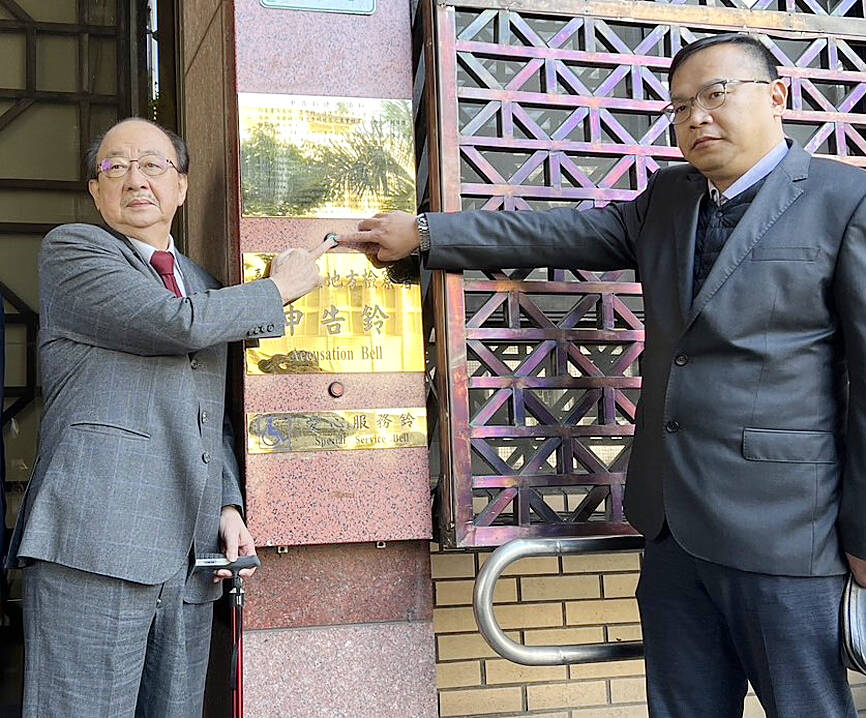A bill to tighten scrutiny on TikTok has been proposed by Democratic Progressive Party (DPP) Legislator Lin Tai-hua (林岱樺) after an altered video of party caucus whip Ker Chien-ming (柯建銘) was spread via the platform.
The video was edited footage of Ker speaking at a news conference, where the audio and subtitles were changed to him saying: “Here is Ker Chien-ming telling you, Taiwan will be left in the darkness if it remains in the hands of the DPP.”
The subtitles were in simplified Chinese, just as in a deepfake video of DPP Legislator Wang Yi-chuan (王義川).

Photo: Reuters
Ker last night issued a statement saying that the video is fake.
He and Wang yesterday filed a complaint with the Criminal Investigation Bureau and the Taipei District Prosecutors’ Office, accusing disseminators on TikTok of defamation and privacy offenses, and the dissemination of false images.
Investigators accepted Ker’s case and said they would look into the origins of the video, National Police Agency Director-General Chang Jung-hsin (張榮興) said.

Photo: Chen Tsai-ling, Taipei Times
At a meeting of the legislature’s Internal Administration Committee yesterday, Minister of the Interior Liu Shyh-fang (劉世芳) said police suspect the video could have originated abroad.
The proposed draft amendments to the Anti-Infiltration Act (反滲透法) stipulate that digital platforms such as TikTok either be supervised in accordance with local regulations or be banned from the local market.
Lin said the proposal has garnered support from multiple legislators and would soon be submitted to the legislature’s committees for review.
“We would demand that TikTok leave Taiwan if it continues to support scams and ‘united front’ activities,” Lin said, adding that the bill was formulated to safeguard democracy and national security in line with the latest regulatory development in Western countries.
According to the bill, TikTok has caused concerns over infringements of national security, personal privacy and democratic politics due to its questionable algorithm and operational mechanism.
If a digital platform such as TikTok has been judged to have such problems, it should abide by the government’s instructions to set up an operating entity and database within the territory of the Republic of China, and come under local jurisdiction and supervision by the cybersecurity management systems, it says.
Lin said China’s cognitive warfare continues to develop, to the extent that disinformation in the form of deepfakes is published on TikTok and other social media platforms, with influencers and public relations companies commissioned to disseminate it.
She also cited the US Court of Appeals as saying that tightened control over TikTok is no more than a countermeasure against external interference and does not contradict the freedom of speech protected by the US Constitution, as China poses a national security threat.
DPP Legislator Puma Shen (沈伯洋) yesterday said that fake videos of politicians and political commentators have become rampant, although most of them were roughly made and can be easily seen through.
“I have been a victim of deepfakes, too,” he said.
Although refined deepfake videos have yet to be launched, they could be released at critical moments, Shen said, calling on the public not to forward such videos.
People should promptly report fake videos to the authorities and, more importantly, refrain from pointing out its errors in case the creators of fake videos use the advice to improve their technology and make it harder to detect fakes next time, he added.
Additional reporting by CNA

Chinese Nationalist Party (KMT) Chairman Eric Chu (朱立倫), spokeswoman Yang Chih-yu (楊智伃) and Legislator Hsieh Lung-chieh (謝龍介) would be summoned by police for questioning for leading an illegal assembly on Thursday evening last week, Minister of the Interior Liu Shyh-fang (劉世芳) said today. The three KMT officials led an assembly outside the Taipei City Prosecutors’ Office, a restricted area where public assembly is not allowed, protesting the questioning of several KMT staff and searches of KMT headquarters and offices in a recall petition forgery case. Chu, Yang and Hsieh are all suspected of contravening the Assembly and Parade Act (集會遊行法) by holding

PRAISE: Japanese visitor Takashi Kubota said the Taiwanese temple architecture images showcased in the AI Art Gallery were the most impressive displays he saw Taiwan does not have an official pavilion at the World Expo in Osaka, Japan, because of its diplomatic predicament, but the government-backed Tech World pavilion is drawing interest with its unique recreations of works by Taiwanese artists. The pavilion features an artificial intelligence (AI)-based art gallery showcasing works of famous Taiwanese artists from the Japanese colonial period using innovative technologies. Among its main simulated displays are Eastern gouache paintings by Chen Chin (陳進), Lin Yu-shan (林玉山) and Kuo Hsueh-hu (郭雪湖), who were the three young Taiwanese painters selected for the East Asian Painting exhibition in 1927. Gouache is a water-based

Taiwan would welcome the return of Honduras as a diplomatic ally if its next president decides to make such a move, Minister of Foreign Affairs Lin Chia-lung (林佳龍) said yesterday. “Of course, we would welcome Honduras if they want to restore diplomatic ties with Taiwan after their elections,” Lin said at a meeting of the legislature’s Foreign Affairs and National Defense Committee, when asked to comment on statements made by two of the three Honduran presidential candidates during the presidential campaign in the Central American country. Taiwan is paying close attention to the region as a whole in the wake of a

OFF-TARGET: More than 30,000 participants were expected to take part in the Games next month, but only 6,550 foreign and 19,400 Taiwanese athletes have registered Taipei city councilors yesterday blasted the organizers of next month’s World Masters Games over sudden timetable and venue changes, which they said have caused thousands of participants to back out of the international sporting event, among other organizational issues. They also cited visa delays and political interference by China as reasons many foreign athletes are requesting refunds for the event, to be held from May 17 to 30. Jointly organized by the Taipei and New Taipei City governments, the games have been rocked by numerous controversies since preparations began in 2020. Taipei City Councilor Lin Yen-feng (林延鳳) said yesterday that new measures by